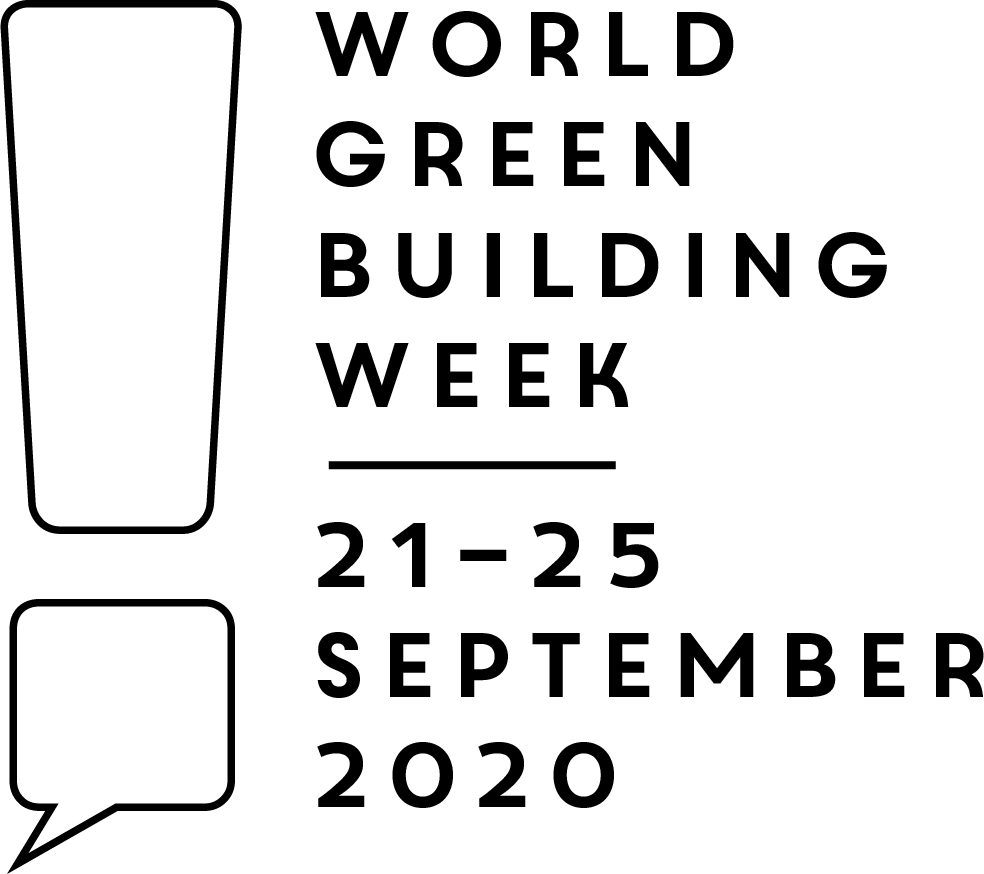
This week, from September 21st to September 25th 2020, World Green Building Council (WGBC) organizes the 11th edition of World Green Building Week which is an annual campaign empowering all relevant stakeholders to deliver greener buildings. This year, the main topic of the week are net zero buildings and the main goal is to mobilize relevant policymakers, governments and building sector to act toward delivering more and more net zero buildings. The campaign is underlined by global goal of tackling the climate change and the belief that each of us can make a difference.
The campaign is built around a key slogan #ActOnClimate and consists of three pillars arguing for support of net zero buildings:
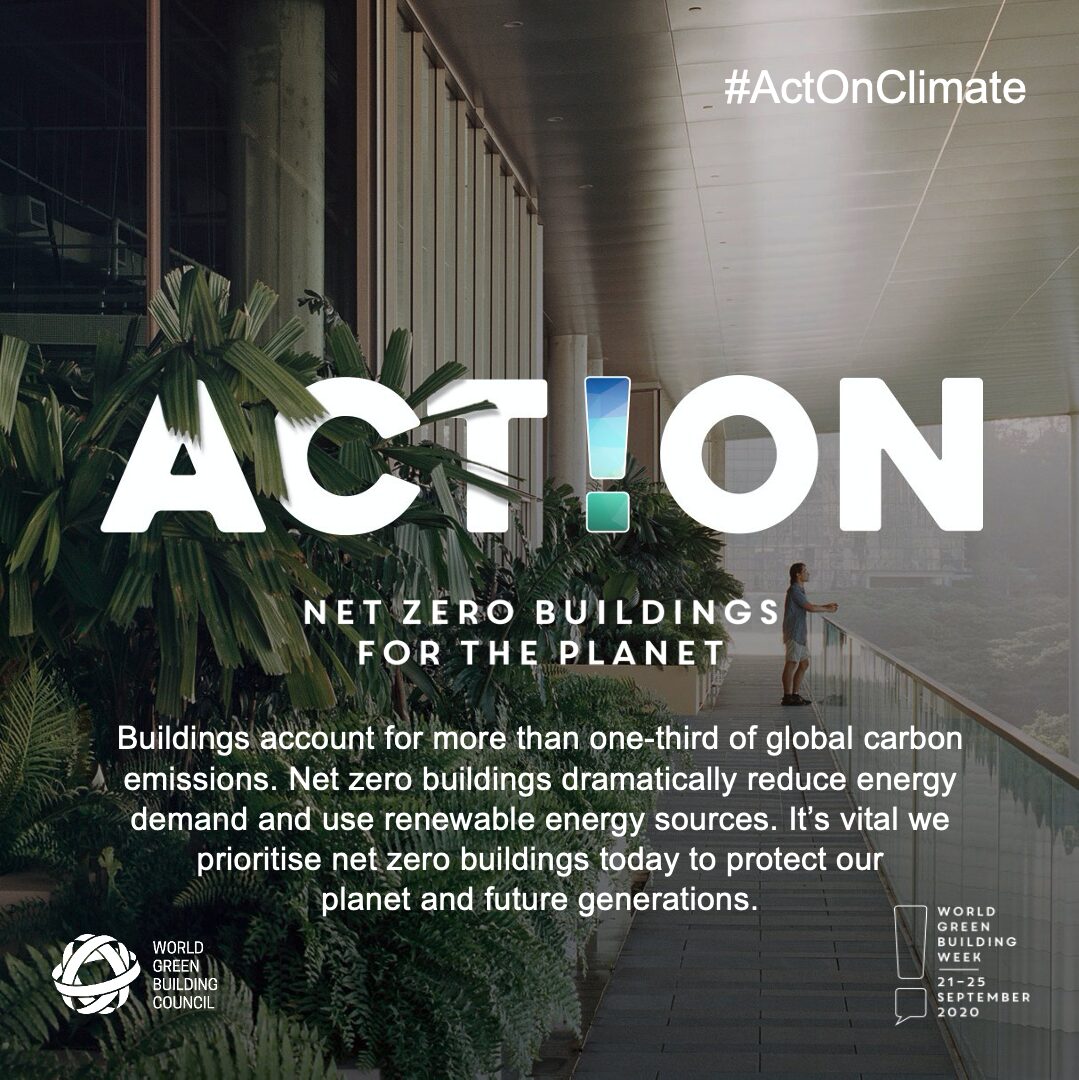
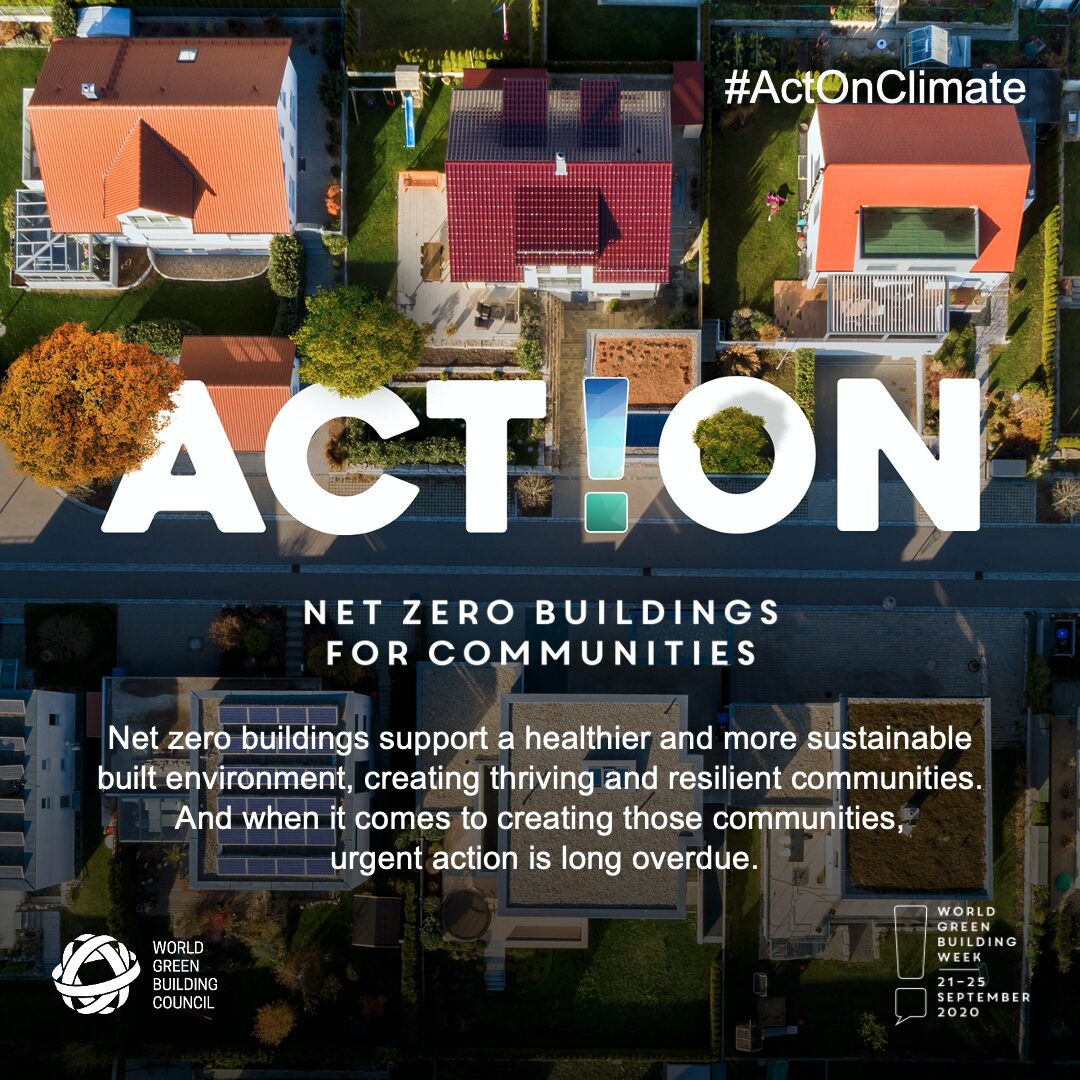
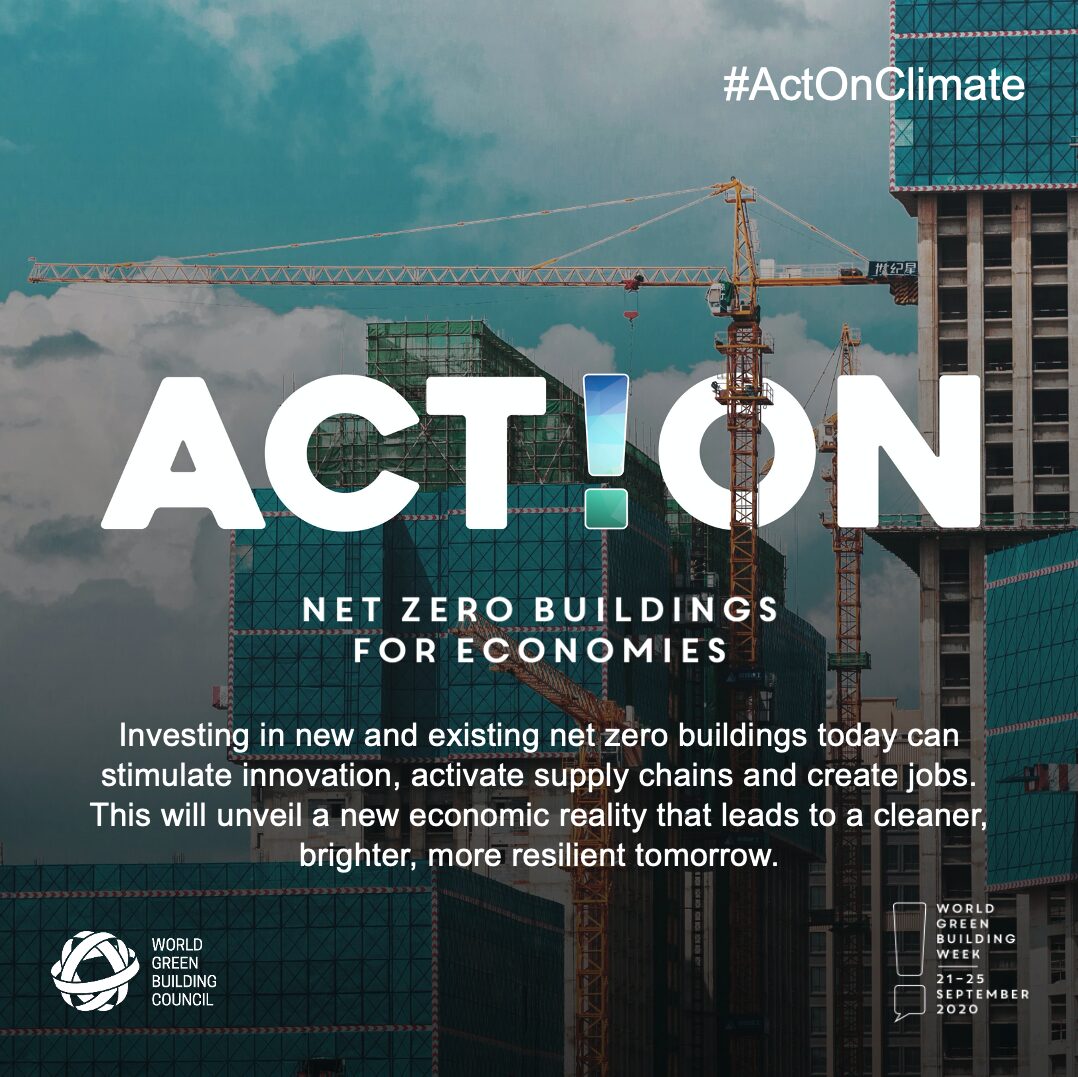
As a part of World Green Building Week 2020, WGBC prepared a Call for Action Statement urging all levels of governance to implement policies that would help achieving a fully decarbonized building and construction sector by 2050 and fulfilling other commitments included in Paris Agreement. This Call for Action Statement can be endorsed here.
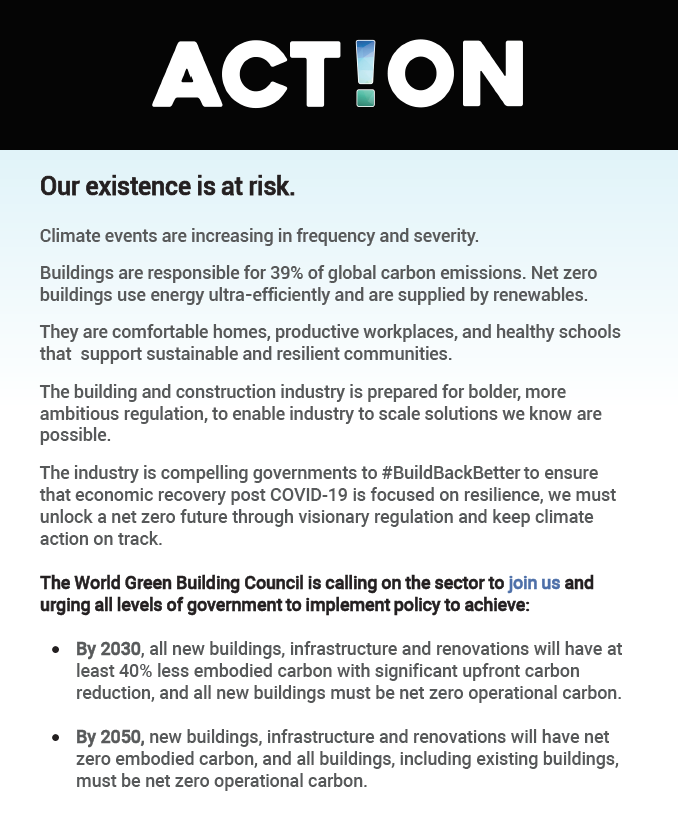
"Net zero carbon buildings: for communities, for the planet, for economies. No matter where you are, you can #ActOnClimate #WGBW2020."
Find more information about WGBC here.
Find more information about World Green Building Week here.
The end of the last year was accompanied by the annual event, the Conference of Parties (COP24), this time held in Katowice, Poland where the talks on climate change challenges took place. Among other things, discussed was also the vision for climate neutral Europe. In reaction to that, World Green Building Council (WorldGBC), in an open letter, calls for recognition of unparalleled potential of the built environment sector which could significantly add to meeting the goals of the Paris Agreement as well as the EU2050 long-term strategy.
Addressing the results of the recent report from the UN Intergovernmental Panel on Climate Change (IPCC), buildings account for :
36% of all emissions
40% of energy and 50% of raw material extraction
1/3rd of all potable water usage
18 million construction jobs in the EU
Based on this fact, the EU2050 should and has to prioritize the reduction of operational carbon emissions in buildings. At the same time, it must recognize the full life cycle impacts of the built environment sector. WorldGBC sees resolution in strengthening the cooperation between the European Commission and countries, cities, companies and even citizens to deliver renovation strategies in building sector. Otherwise, the success in net zero emission economy is not reachable.
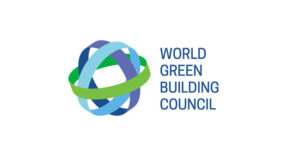
Find the open letter in full here.

The 24th Conference of the Parties (COP24) to The United Nations Framework Convention on Climate Change (UNFCCC) took place in Katowice, Poland from 2-14 December 2018. The main task of this UN climate conference was to negotiate and agree on different topics regarding the principles aimed at full implementation of the Paris Agreement, a “rulebook” to sustainable global climate policy signed in 2015. The preliminary goal of Polish Presidency was to adopt The Paris Rulebook and create a universal systemic solution and a comprehensive approach to all important areas of emission instead of concentrating only on fragmented point-based objectives.
COP24's key outcomes include the Paris Rulebook which is the first ever flexible system applicable for all Parties with tracking and reporting function of progress in climate action. This will allow Parties to communicate the progress and practices and compare with other actors. In regards to the EU, the rulebook will help delivering the 2030 Climate and Energy Framework.
Part of the Paris Agreement is also Global Stocktake Process which works on a mechanism of five-year cycle of countries' reviewing and reporting on progress towards the long-term Paris goal - avoiding, or at least controlling, the global warming. The structure of the stocktake process will be divided into three stages:
Among the stages, there is also a section on "loss and damage" which refer to unavoidable impacts of climate change, added especially as a response to vulnerable and developing countries.
The World Health Organization (WHO) was asked to contribute to COP24 with a special report on climate change in regards to health challenges connected to the issue. The initiative was built around the argument of delivering the sensitiveness of health to climate variation and change as well as its consideration in creation the policies and other programs. It is to point out that not only economic benefits are connected to tackling the climate change, but so is the overall health of populations.
In the report, WHO refers to air pollution as to one of the most direct linkages between climate change and ill health. Polluting energy systems are recognized as a heavy source of climate change and air pollution.
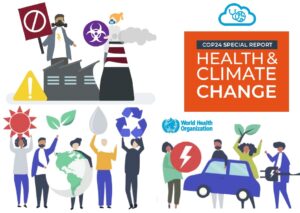
According to their research, almost four million deaths a year are caused by indoor pollution from use of solid fuels for cooking in poor households.
Section dedicated to residential and other buildings points out mostly to improper ways of heating and cooking as the main challenge especially in low and middle-income countries and other rural populations in different regions. Using inefficient stoves or even open fires means burning solid fuels and thus contributing to climate change and health issues, too.
Nearly three billion people lack access to clean fuels and stoves for cooking.
What is important is the fact that to step from polluting energy system does not necessarily mean to invest only in renewable energy. It is the best and most efficient way but in poor regions, replacing other solid fuels with, for example, liquified petroleum gas can bring a significant difference, even though it is still a fossil fuel.
Another problem identified by WHO is heavy subsidization of fossil fuels which in fact lowers its price and causes overconsumption. They call for investing more in clean energy and even give an example of households possibly benefiting from lowered clean-burning liquid petroleum gas prices in exchange from using polluting solid fuels producing indoor air pollution.
Special initiative (2016) was proposed by the European Commission in case of coal and carbon-intensive regions in transition so that they can also benefit from clean energy transition which is one of the preliminary goals of Clean Energy for All Europeans Package.
Find more information about COP24 here.
Find WHO's COP24 Special Report in full here.
Find Energy Efficiency Magazine for COP24 here.
When buildings are net zero they use clean energy, are highly efficient and don’t waste energy - helping us to win the fight against climate change. That makes them heroes. Let’s make all buildings net zero by 2050.
#OurHeroIsZero
World Green Building Week, 25 September to 1 October 2017, is an annual event that empowers the green building community to deliver green buildings for everyone, everywhere. Buildings can be heroes in the fight against climate change - and so can you.
Buildings are often seen as the villains when it comes to climate change, but they can actually be the heroes; heroes who like us, care about our future. They’re called net zero buildings, and every step we take to make our buildings get close to net zero is important.
This World Green Building Week WorldGBC is encouraging people everywhere to see the faces of the heroes in the buildings where they live and work and to join them in the mission to make all buildings net zero. In this fight, our hero is zero.
Join the movement - by downloading our resources, adding your actions to our Hero Action Map, or by signing up to Thunderclap social media campaign at the World Green Building Council website.
World Green Building Week is the flagship event of the global green building movement organised by WorldGBC and led by its network of over 70 Green Building Councils and their 32,000 member companies.